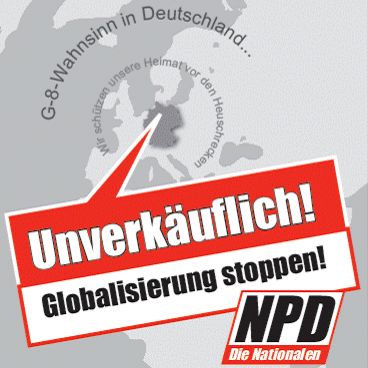With the international media focused on the violent clashes between left-wing "anti-globalization" activists and German police at the anti-G-8 protest in Rostock this past weekend, another component of Germany's broad "anti-globalization" consensus will have passed largely unperceived: namely, the neo-Nazis of the National-Democratic Party of Germany or NPD. Under the motto "There is no such thing as fair globalization," an NPD-sponsored anti-G-8 demonstration had been scheduled to take place in the nearby city of Schwerin on Saturday, the same day as the "leftist" demonstration in Rostock. The NPD protest was, however, cancelled at the last minute, as the state supreme court of Mecklenburg-Vorpommern, citing the potential for violence, upheld a ban issued by the local authorities. In light of the entirely predictable rioting of the leftist "Black Block" in Rostock -- leading to the violence that left nearly 1000 injured, including some 433 police officers -- the court's grounds, it must be said, now seem rather feeble. In spite of the ban, over 1,500 NPD members are reported to have taken part in smaller, "spontaneous" anti-G-8 protests in several German cities. Over 100 are reported to have marched through Berlin's central Brandenburg Gate. As documented on the NPD Web site -- but virtually ignored by not only the international, but also the German media -- some 50 NPD members, including three members of the regional parliament of Saxony, managed briefly to occupy the steps of the German Reichstag, unfurling anti-G-8 banners and waving NPD flags. "Under the gable of the western entrance to the Reichstag building with its inscription 'To the German People'," an NPD press release notes, "there now suddenly took place a national protest in favor of a world of free peoples and against the economically, socially and culturally disastrous consequences of globalization." The protest, the press release affirms, "met with much approval from tourists and passers-by." Since the Iraq War, hostility to the G-8 and globalization has become a central theme of new Nazi ideology. According to the neo-Nazis, the "Judeo-American" West is locked in a struggle with so-called "autochthonous" peoples the world over. In neo-Nazi terminology -- and in keeping with the "blood and soil" criteria of classical Nazism -- "autochthonous" peoples could as well be the indigenous Amerindian populations of Bolivia or Peru as, say, the (supposedly equally "indigenous") ethnic Germans of South Tyrol or Germany itself. In terms not unlike those of left-wing "anti-imperialists," the neo-Nazis militate in favor of the "freedom of peoples" and against a globalization that they present as an expression of American imperialism.
Germany’s Other Anti-Globalists: Neo-Nazis Against the G-8

